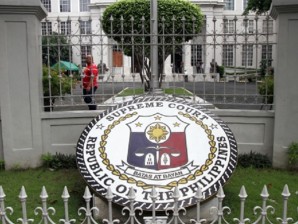
INQUIRER FILE PHOTO
MANILA, Philippines—A Supreme Court justice has handed a stinging rebuke to colleagues who voted to dismiss outright a petition by Marinduque Representative Regina Ongsiako-Reyes to stop the Commission on Elections from disqualifying her for being allegedly a US citizen, in a ruling that favored the son of one of the court’s justices.
In his 21-page dissenting opinion, Justice Arturo Brion accused the majority of a “rush to judgment” and criticized the June 18 majority ruling for being arrived at without seeking comment from the Comelec, for failing to rule on the merits of the case, and for encroaching on the jurisdiction of the House of Representatives Electoral Tribunal.
“I submit this dissenting opinion to express my strong reservations to the majority’s outright dismissal of this most ‘unusual’ case—a term I do not use lightly,” Brion said in his dissent, which was posted on the Supreme Court’s website.
Brion’s dissent was supported by Justices Antonio Carpio, Martin Villarama and Marvic Leonen.
According to Brion, the questions raised in Reyes’ petition were “not too unsubstantial to warrant further proceedings,” as the majority of justices ruled.
“[U]nless the case is clearly and patently shown to be without basis and out of our sense of delicadeza (which we should have), the court should at least hear and consider both sides before making a ruling that would favor the son of a member of the court,” he said.
“If this court is indeed serious in administering justice or at least to be seen to be administering justice in the way described in the speeches of many a justice of this court, it should not deliver the kind of hasty and imprudent action that it did in this case. The proper course of action, if the court indeed honestly wants to achieve this objective in the present case, is to require the Comelec to comment on the petition and to decide matters from that point,” he added.
Brion said the outright dismissal of Reyes’ petition left the losing candidate, Lord Allan Jay Velasco of the National Unity Party, as the “indirect beneficiary” because he would then be proclaimed the real winner upon Reyes’ disqualification. Had the case reached the court via the HRET, Reyes’ disqualification, if upheld, would have left the congressional seat vacant and new elections would have to be held.
Velasco is the son of Justice Presbitero Velasco Jr., who, along with Justices Jose Mendoza and Estela Perlas-Bernabe, inhibited themselves from the case.
The majority decision, penned by Justice Jose Perez, was backed by Chief Justice Ma. Lourdes Sereno and Justices Teresita Leonardo-De Castro, Lucas Bersamin, Mariano del Castillo, Roberto Abad and Bienvenido Reyes.
Brion also said that the majority’s claim that the jurisdiction of the HRET applied only after the candidate has assumed office on June 30 was contrary to prevailing jurisprudence.
“[I]n fact, it is a major retrogressive jurisprudential development that can emasculate the HRET,” he said.
The Comelec en banc, on May 14, affirmed the ruling of the commission’s First Division that declared Reyes was disqualified to run for public office for holding a US passport and for failing to renounce her US citizenship, which she acquired when she married a US citizen. With her being a naturalized US citizen, Reyes was also ruled to be an illegitimate resident of Marinduque and thus disqualified from running for office.
Reyes was proclaimed winner of the congressional race by the provincial board of canvassers, technically an arm of the Comelec, on May 18.
The Comelec upheld with finality its decision to disqualify Reyes on June 5.
Reyes, a member of the ruling Liberal Party, took her oath of office before House Speaker Feliciano Belmonte on June 7, She filed her suit at the Supreme Court on the same day, accusing the Comelec of grave abuse of discretion and stating that the HRET should already have acquired jurisdiction over the case.
On June 18, the high court, voting 7-4, issued a resolution denying Reyes’ petition. The majority said the Comelec retained jurisdiction of the case because, among others, Reyes had not yet begun serving her term as congresswoman.
Brion said that the intervening events should have made the court conduct further inquiries and exercise prudence.
“In this situation, the court cannot simply go through the motions of evaluation and then simply strike out the petitioner’s positions. Some, to be sure, may label the denial of further inquiry to lack of prudence; other’s, not so charitably minded, may however, refer to this as partisanship. I can only surmise that the majority might have considered the jurisdictional issues raised ‘too insubstantial to warrant further proceedings.’ Is this still lack of prudence?” he said.
On the issue of jurisdiction, Brion said the court should have at least asked for comment from Comelec, the Office of the Solicitor General and the HRET before dismissing Reyes’ petition outright.
Brion added that the Comelec “does not appear to have an airtight case based on substantial evidence on the citizenship and residence issues, and much less a similar case on the jurisdictional issue, to justify a very prompt outright dismissal action” from the court since Reyes still had “arguably meritorious positions” to support her cause that the court deserved to hear.